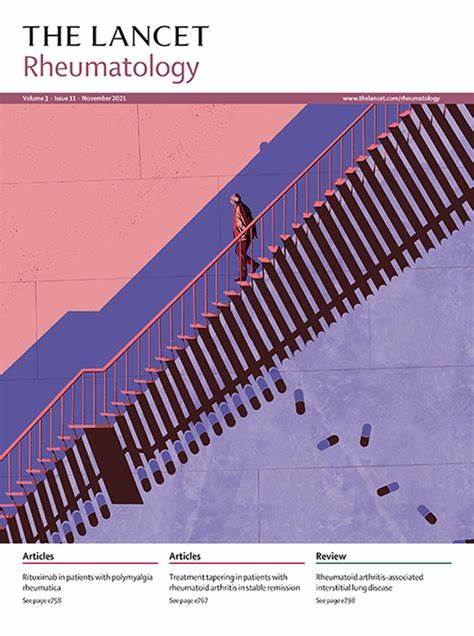Association of nirmatrelvir–ritonavir with post-acute sequelae and mortality among patients who are immunocompromised with COVID-19 in Hong Kong: a retrospective cohort study
IF 15
1区 医学
Q1 RHEUMATOLOGY
引用次数: 0
Abstract
Background
The effect of nirmatrelvir–ritonavir on post-COVID-19 outcomes for individuals who are immunocompromised is understudied. We aimed to examine the association of nirmatrelvir–ritonavir with post-acute sequelae and mortality among patients who are immunocompromised and admitted to hospital with COVID-19.
Methods
We did a retrospective cohort study using territory-wide electronic health records from the Hong Kong Hospital Authority and Hong Kong Department of Health. Eligible patients were adults aged 18 years or older who tested positive for SARS-CoV-2 during the study period (March 11, 2022, to Nov 9, 2023) and were admitted to hospital with COVID-19. Four exposure groups were formed based on immune status (immunocompromised or immunocompetent) and nirmatrelvir–ritonavir status (yes or no). The primary outcome was post-acute inpatient death, starting from 21 days after the positive RT-PCR date. Standardised mortality ratio weighting with doubly robust adjustment was applied to control for confounders. Cox models were used to estimate hazard ratios (HRs) for the outcomes.
Findings
Between March 11, 2022, and Nov 9, 2023, there were 89 772 individuals with positive RT-PCR tests, of whom 39 923 met eligibility criteria and were included in the study cohort. 19 914 (49·9%) of 39 923 patients were female, 20 009 (50·1%) were male and the median age was 75·0 years (IQR 63·0–85·0). 846 (38·2%) of 2217 patients who were immunocompromised and 14 586 (38·7%) of 37 706 patients who were immunocompetent were prescribed nirmatrelvir–ritonavir. Among the patients who were immunocompromised, those patients who received nirmatrelvir–ritonavir had significantly lower risk of post-acute inpatient death (HR 0·58, 95% CI 0·45–0·74; p<0·0001) and hospitalisation for acute respiratory distress syndrome (0·43, 0·20–0·90; p=0·024) than those who did not. A significant negative interaction was found between immune status and nirmatrelvir–ritonavir on post-acute all-cause hospitalisation (relative excess risk due to interaction –0·84, 95% CI –1·30 to –0·37; p=0·0004).
Interpretation
Nirmatrelvir–ritonavir was associated with reduced risk of post-acute inpatient death among patients who were immunocompromised and admitted to hospital with COVID-19. However, the effectiveness of nirmatrelvir–ritonavir on post-acute hospitalisation outcomes was less pronounced in patients who were immunocompromised than in patients who were immunocompetent.
Funding
Health and Medical Research Fund, Research Grants Council theme-based research schemes, and Research Grants Council Collaborative Research Fund.
香港感染 COVID-19 病毒的免疫力低下患者中,尼马瑞韦-利托那韦与急性后遗症和死亡率的关系:一项回顾性队列研究。
背景:目前还没有充分研究尼马瑞韦-利托那韦对免疫功能低下患者 COVID-19 后遗症的影响。我们的目的是研究在因 COVID-19 而入院的免疫力低下患者中,尼马瑞韦-利托那韦与急性后遗症和死亡率之间的关系:我们利用香港医院管理局和香港卫生署的全港电子健康记录进行了一项回顾性队列研究。符合条件的患者是在研究期间(2022 年 3 月 11 日至 2023 年 11 月 9 日)对 SARS-CoV-2 检测呈阳性并因 COVID-19 入院的 18 岁或以上成年人。根据免疫状态(免疫功能低下或免疫功能健全)和尼马替雷韦-利托那韦状态(是或否)分为四组。主要结果是急性期后住院病人死亡,从 RT-PCR 阳性日期后 21 天开始计算。采用标准化死亡率加权和双重稳健调整来控制混杂因素。采用Cox模型估算结果的危险比(HRs):2022年3月11日至2023年11月9日期间,共有89 772人的RT-PCR检测结果呈阳性,其中39 923人符合资格标准并被纳入研究队列。39 923 名患者中有 19 914 人(49-9%)为女性,20 009 人(50-1%)为男性,年龄中位数为 75-0 岁(IQR 63-0-85-0)。在 2217 名免疫力低下的患者中,有 846 人(38-2%)获得了尼马瑞韦-利托那韦处方;在 37 706 名免疫力正常的患者中,有 14 586 人(38-7%)获得了尼马瑞韦-利托那韦处方。在免疫力低下的患者中,接受尼马瑞韦-利托那韦治疗的患者急性住院后死亡的风险显著降低(HR 0-58,95% CI 0-45-0-74;P解释:尼马瑞韦-利托那韦治疗的患者急性住院后死亡的风险显著降低(HR 0-58,95% CI 0-45-0-74):在因感染COVID-19而入院的免疫力低下患者中,接受尼马替尼-利托那韦治疗可降低急性期后住院患者的死亡风险。然而,与免疫功能正常的患者相比,免疫功能低下的患者使用尼尔马特雷韦-利托那韦对急性期后住院治疗结果的效果并不明显:经费来源:健康与医学研究基金、研究资助委员会主题研究计划和研究资助委员会合作研究基金。
本文章由计算机程序翻译,如有差异,请以英文原文为准。
求助全文
约1分钟内获得全文
求助全文
来源期刊

Lancet Rheumatology
RHEUMATOLOGY-
CiteScore
34.70
自引率
3.10%
发文量
279
期刊介绍:
The Lancet Rheumatology, an independent journal, is dedicated to publishing content relevant to rheumatology specialists worldwide. It focuses on studies that advance clinical practice, challenge existing norms, and advocate for changes in health policy. The journal covers clinical research, particularly clinical trials, expert reviews, and thought-provoking commentary on the diagnosis, classification, management, and prevention of rheumatic diseases, including arthritis, musculoskeletal disorders, connective tissue diseases, and immune system disorders. Additionally, it publishes high-quality translational studies supported by robust clinical data, prioritizing those that identify potential new therapeutic targets, advance precision medicine efforts, or directly contribute to future clinical trials.
With its strong clinical orientation, The Lancet Rheumatology serves as an independent voice for the rheumatology community, advocating strongly for the enhancement of patients' lives affected by rheumatic diseases worldwide.
 求助内容:
求助内容: 应助结果提醒方式:
应助结果提醒方式:


